 It is exciting to see widening recognition that brand survival depends on improving the lives of customers, not merely “pushing product” as they are accustomed to doing. In the latest example, Business Should Focus on Sociality, Not Social “Media”, Umair Haque offered a case for the end of social media and the disruption of many Industrial Economy structures, namely the social contract. It is exciting to see widening recognition that brand survival depends on improving the lives of customers, not merely “pushing product” as they are accustomed to doing. In the latest example, Business Should Focus on Sociality, Not Social “Media”, Umair Haque offered a case for the end of social media and the disruption of many Industrial Economy structures, namely the social contract.
As regular readers well know, I agree with Haque’s key thesis, that brands need to jettison their legacy focus on products/services in favor of dedicating themselves to helping users achieve outcomes while using their products. I have often written that humans and their organizations will have to adopt a more collaborative and responsible attitude and approach in general. However, I don’t agree with him that there’s only one way to do “sociality” as he implies by his assertion that brands have an “existential responsibility” to “the art of living.” Here I’ll explain the differences, which will help brand stewards understand the nuances of brands’ disruption.
[…]
Unusual strategy & management guide shows how to use social data to solve complex problems 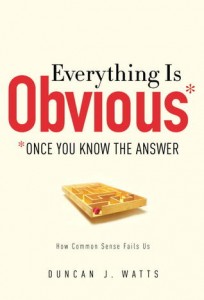 Book Review: Everything Is Obvious* Once You Know the Answer/Duncan J. Watts Book Review: Everything Is Obvious* Once You Know the Answer/Duncan J. Watts
Everything Is Obvious* is an excellent how-to guide to understanding how social networks change strategy, prediction and decision-making. It offers practical techniques and profound insights for using social networks, big data and new ways of thinking to solve complex problems in business and government.
Intriguingly, the book also cites research that debunks several social media sacred cows.
Watts has an interesting point of view because he combines several disciplines: he began his career as a physicist before moving into sociology, so he strives to combine the quantitative, experimental methods of physics with maddeningly complex social problems. Moreover, he’s been running practical experiments at Yahoo! for several years, using search, Web and social data. Watts backs up his assertions with primary research that he has led or in which he has participated. He is also a very engaging writer.
I also highly recommend “Obvious” because it enables […]
 I covered the Federal Reserve Bank of Chicago Economic Forecast last week, where all speakers issued this refrain: “More of the same.” Key economic indicators have been stuck in neutral—the proverbial “sideways” movement—so the consensus in the room was one of faint frustration tempered by gratitude. Everyone had lived through worse. I covered the Federal Reserve Bank of Chicago Economic Forecast last week, where all speakers issued this refrain: “More of the same.” Key economic indicators have been stuck in neutral—the proverbial “sideways” movement—so the consensus in the room was one of faint frustration tempered by gratitude. Everyone had lived through worse.
The current “recovery” is underperforming any other in recent memory according to many measures, especially employment.
The conference was very well organized and featured expert presenters. Reading between the lines, I perceive significant opportunity that will surprise most people. After my notes of speakers’ remarks, I’ll share my thoughts on 2013’s opportunity that is evident when one regards “the economy” from a different point of view.
Everyone wonders what kind of presents we will open in 2013 (right).
[…]
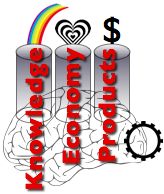 [UPDATED] Several profound market forces are preparing the ascendancy of Knowledge Economy products, which result from collaboration among designers, artists, engineers, customers and firms. This represents one of the Knowledge Economy’s most exciting-yet-disruptive elements: “products” will cease to be dominated by monolithic factories that mass produce virtually all items that people use and consume. Moreover, people have an inherent joy when they can make things for themselves, their friends and their families—and a dramatic new wave of creativity and innovation is imminent. To help you wrap your mind around Knowledge Economy products, this post will recall what happened to mass media and entertainment industries. [UPDATED] Several profound market forces are preparing the ascendancy of Knowledge Economy products, which result from collaboration among designers, artists, engineers, customers and firms. This represents one of the Knowledge Economy’s most exciting-yet-disruptive elements: “products” will cease to be dominated by monolithic factories that mass produce virtually all items that people use and consume. Moreover, people have an inherent joy when they can make things for themselves, their friends and their families—and a dramatic new wave of creativity and innovation is imminent. To help you wrap your mind around Knowledge Economy products, this post will recall what happened to mass media and entertainment industries.
Knowledge Economy products are conceived, designed, prototyped and fabricated in the Social Channel. Best practices in open source, Agile development, design and Web development will unleash continuous innovation at a scale and pace we’ve never seen before. Knowledge and innovation will be free in the Knowledge Economy because all supporting processes will become an order of magnitude faster and cheaper. Firms and brands that do not recognize and respond quickly enough will become irrelevant.
Most brands […]
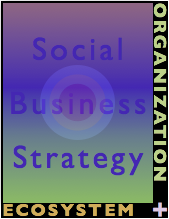 The social business Organization Audit serves as the second half of the due diligence process that is the foundation of the social business strategy. The first part is the ecosystem audit by which the firm has assessed the external digital world that’s relevant to its business. However, this is only half the picture: now we need to assess the firm’s capabilities to engage the ecosystem, so this is an internal analysis. The social business Organization Audit serves as the second half of the due diligence process that is the foundation of the social business strategy. The first part is the ecosystem audit by which the firm has assessed the external digital world that’s relevant to its business. However, this is only half the picture: now we need to assess the firm’s capabilities to engage the ecosystem, so this is an internal analysis.
By conducting external and internal due diligence, we arrive at a social business strategy that optimizes the what the ecosystem values most highly with the firm’s ability to deliver. The social business strategy marries the ecosystem audit with the organization audit to determine optimal sharing scenarios (pilots).
The social business Organization Audit begins with a basic core competency analysis, drills down to stakeholder issues & actions and synthesizes these steps into several “trial pilots” that it will then vet through several other steps: social business good practices uses the ecosystem as a filter to learn from other firms’ similar initiatives, resource analysis gauges […]
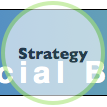 When CSRA released the Social Network Roadmap in Q2 2008, we were a unique voice speaking at conferences about enterprise adoption. Due to my prior work helping enterprises adopt disruptive technologies like distributed computing, Web applications, service-oriented architecture and Web services, it was easy to see what enterprise adoption would look like, so I designed Social Network Roadmap several years before most of the market was ready to use it. Our client work has enabled us to test, tweak and expand the roadmap since then. As 2012 draws to a close, enterprises have experimented, adoption of social technologies (“social media”) among most stakeholders has set records, and executives wonder how they can coordinate social business across the enterprise. To realize “compounded” enterprise social business benefits it’s important to understand the social business life cycle, so here is a brief treatment. When CSRA released the Social Network Roadmap in Q2 2008, we were a unique voice speaking at conferences about enterprise adoption. Due to my prior work helping enterprises adopt disruptive technologies like distributed computing, Web applications, service-oriented architecture and Web services, it was easy to see what enterprise adoption would look like, so I designed Social Network Roadmap several years before most of the market was ready to use it. Our client work has enabled us to test, tweak and expand the roadmap since then. As 2012 draws to a close, enterprises have experimented, adoption of social technologies (“social media”) among most stakeholders has set records, and executives wonder how they can coordinate social business across the enterprise. To realize “compounded” enterprise social business benefits it’s important to understand the social business life cycle, so here is a brief treatment.
[…]
How to Outperform by Managing the Social Business Risks that Slow Your Competitors
 By understanding the dirty dozen social business risks, you can make fewer mistakes than your rivals and get more done for less money, so this may be one of the most valuable posts you read this year. Having advised executives in adopting disruptive technology since the 1980s, I have learned that hidden assumptions sabotage early adopters’ investments and delay desired business outcomes. Happily, early adopters can significantly diminish social business risks by looking for them and mitigating them with agile development methodologies. CSRA’s client work has shown that using a risk mitigation approach is the most effective way to increase social business return on investment. By understanding the dirty dozen social business risks, you can make fewer mistakes than your rivals and get more done for less money, so this may be one of the most valuable posts you read this year. Having advised executives in adopting disruptive technology since the 1980s, I have learned that hidden assumptions sabotage early adopters’ investments and delay desired business outcomes. Happily, early adopters can significantly diminish social business risks by looking for them and mitigating them with agile development methodologies. CSRA’s client work has shown that using a risk mitigation approach is the most effective way to increase social business return on investment.
[…]
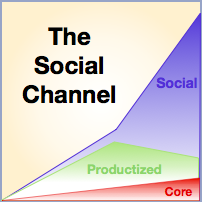 The Social Channel of Value explains our era’s drivers of economic transformation and how leaders can use them to strengthen their careers, organizations and communities. Profound shifts in human beings’ means of production restructure society and business because they alter the amount of “value” human work can create as well as the type of “products” that encapsulate people’s work. Individuals and organizations that notice, observe and understand these shifts early on can improve their relevance and competitiveness. Many of those that do not respond quickly enough go down with the ship. The Social Channel of Value explains our era’s drivers of economic transformation and how leaders can use them to strengthen their careers, organizations and communities. Profound shifts in human beings’ means of production restructure society and business because they alter the amount of “value” human work can create as well as the type of “products” that encapsulate people’s work. Individuals and organizations that notice, observe and understand these shifts early on can improve their relevance and competitiveness. Many of those that do not respond quickly enough go down with the ship.
Since the Social Channel is so important, I have published the Social Channel Trilogy, which is summarized here. Find even more information on the Social Channel home page.
[…]
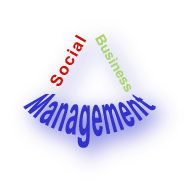 Social business policy (social media policy) engagements are some of the most interesting, revealing and critical engagements CSRA has done. Of course, organizations’ main motivation for creating social business policies is protecting themselves against possible legal threats caused by employee interactions online; however, a far greater threat is overemphasizing the legal threat and sabotaging employee engagement online. Well researched and crafted social business policy increases trust between the employer and employees—and among employees, leading to more appropriate online interactions, which burnish the firm’s reputation. Here, I’ll outline how you can use the process of creating the policy to manage legal exposure while increasing employees’ trust and productive social business activity. Social business policy (social media policy) engagements are some of the most interesting, revealing and critical engagements CSRA has done. Of course, organizations’ main motivation for creating social business policies is protecting themselves against possible legal threats caused by employee interactions online; however, a far greater threat is overemphasizing the legal threat and sabotaging employee engagement online. Well researched and crafted social business policy increases trust between the employer and employees—and among employees, leading to more appropriate online interactions, which burnish the firm’s reputation. Here, I’ll outline how you can use the process of creating the policy to manage legal exposure while increasing employees’ trust and productive social business activity.
[…]
 Bill Snyder at Infoworld posted some amazing statistics that support the end of social media as we know it, which I predicted in 2009. Marketing and public relations have been losing influence for years because they are impersonal, and people prefer personalized interactions (deep dive here), so marketers and their vendors are grasping at straws. In this context, “social media” has generally been practiced as a shallow promotional activity, and my premise in predicting its demise is that the true potential of social technologies is creating and maintaining relationships, which are based on personalized attention and caring. Bill Snyder at Infoworld posted some amazing statistics that support the end of social media as we know it, which I predicted in 2009. Marketing and public relations have been losing influence for years because they are impersonal, and people prefer personalized interactions (deep dive here), so marketers and their vendors are grasping at straws. In this context, “social media” has generally been practiced as a shallow promotional activity, and my premise in predicting its demise is that the true potential of social technologies is creating and maintaining relationships, which are based on personalized attention and caring.
[…]
|
|
 It is exciting to see widening recognition that brand survival depends on improving the lives of customers, not merely “pushing product” as they are accustomed to doing. In the latest example, Business Should Focus on Sociality, Not Social “Media”, Umair Haque offered a case for the end of social media and the disruption of many Industrial Economy structures, namely the social contract.
It is exciting to see widening recognition that brand survival depends on improving the lives of customers, not merely “pushing product” as they are accustomed to doing. In the latest example, Business Should Focus on Sociality, Not Social “Media”, Umair Haque offered a case for the end of social media and the disruption of many Industrial Economy structures, namely the social contract.
 Book Review: Everything Is Obvious* Once You Know the Answer/Duncan J. Watts
Book Review: Everything Is Obvious* Once You Know the Answer/Duncan J. Watts  I covered the Federal Reserve Bank of Chicago Economic Forecast last week, where all speakers issued this refrain: “More of the same.” Key economic indicators have been stuck in neutral—the proverbial “sideways” movement—so the consensus in the room was one of faint frustration tempered by gratitude. Everyone had lived through worse.
I covered the Federal Reserve Bank of Chicago Economic Forecast last week, where all speakers issued this refrain: “More of the same.” Key economic indicators have been stuck in neutral—the proverbial “sideways” movement—so the consensus in the room was one of faint frustration tempered by gratitude. Everyone had lived through worse. [UPDATED] Several profound market forces are preparing the ascendancy of Knowledge Economy products, which result from collaboration among designers, artists, engineers, customers and firms. This represents one of the Knowledge Economy’s most exciting-yet-disruptive elements: “products” will cease to be dominated by monolithic factories that mass produce virtually all items that people use and consume. Moreover, people have an inherent joy when they can make things for themselves, their friends and their families—and a dramatic new wave of creativity and innovation is imminent. To help you wrap your mind around Knowledge Economy products, this post will recall what happened to mass media and entertainment industries.
[UPDATED] Several profound market forces are preparing the ascendancy of Knowledge Economy products, which result from collaboration among designers, artists, engineers, customers and firms. This represents one of the Knowledge Economy’s most exciting-yet-disruptive elements: “products” will cease to be dominated by monolithic factories that mass produce virtually all items that people use and consume. Moreover, people have an inherent joy when they can make things for themselves, their friends and their families—and a dramatic new wave of creativity and innovation is imminent. To help you wrap your mind around Knowledge Economy products, this post will recall what happened to mass media and entertainment industries. By understanding the dirty dozen social business risks, you can make fewer mistakes than your rivals and get more done for less money, so this may be one of the most valuable posts you read this year. Having advised executives in adopting disruptive technology since the 1980s, I have learned that hidden assumptions sabotage early adopters’ investments and delay desired business outcomes. Happily, early adopters can significantly diminish social business risks by looking for them and mitigating them with agile development methodologies. CSRA’s client work has shown that using a risk mitigation approach is the most effective way to increase social business return on investment.
By understanding the dirty dozen social business risks, you can make fewer mistakes than your rivals and get more done for less money, so this may be one of the most valuable posts you read this year. Having advised executives in adopting disruptive technology since the 1980s, I have learned that hidden assumptions sabotage early adopters’ investments and delay desired business outcomes. Happily, early adopters can significantly diminish social business risks by looking for them and mitigating them with agile development methodologies. CSRA’s client work has shown that using a risk mitigation approach is the most effective way to increase social business return on investment. The Social Channel of Value explains our era’s drivers of economic transformation and how leaders can use them to strengthen their careers, organizations and communities. Profound shifts in human beings’ means of production restructure society and business because they alter the amount of “value” human work can create as well as the type of “products” that encapsulate people’s work. Individuals and organizations that notice, observe and understand these shifts early on can improve their relevance and competitiveness. Many of those that do not respond quickly enough go down with the ship.
The Social Channel of Value explains our era’s drivers of economic transformation and how leaders can use them to strengthen their careers, organizations and communities. Profound shifts in human beings’ means of production restructure society and business because they alter the amount of “value” human work can create as well as the type of “products” that encapsulate people’s work. Individuals and organizations that notice, observe and understand these shifts early on can improve their relevance and competitiveness. Many of those that do not respond quickly enough go down with the ship. Social business policy (social media policy) engagements are some of the most interesting, revealing and critical engagements CSRA has done. Of course, organizations’ main motivation for creating social business policies is protecting themselves against possible legal threats caused by employee interactions online; however, a far greater threat is overemphasizing the legal threat and sabotaging employee engagement online. Well researched and crafted social business policy increases trust between the employer and employees—and among employees, leading to more appropriate online interactions, which burnish the firm’s reputation. Here, I’ll outline how you can use the process of creating the policy to manage legal exposure while increasing employees’ trust and productive social business activity.
Social business policy (social media policy) engagements are some of the most interesting, revealing and critical engagements CSRA has done. Of course, organizations’ main motivation for creating social business policies is protecting themselves against possible legal threats caused by employee interactions online; however, a far greater threat is overemphasizing the legal threat and sabotaging employee engagement online. Well researched and crafted social business policy increases trust between the employer and employees—and among employees, leading to more appropriate online interactions, which burnish the firm’s reputation. Here, I’ll outline how you can use the process of creating the policy to manage legal exposure while increasing employees’ trust and productive social business activity.